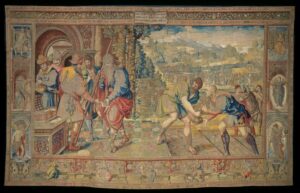We know all about the commands in Exodus, Numbers and Deuteronomy ordering Israel to wipe out, annihilate, the Canaanites. The command was to tear down their altars, destroy their cities and avoid forming any alliances with them, certainly not to intermarry with them. The Book of Genesis is evidence that some of the authors of the biblical books had a very different view of how their neighbours should be treated. [I am writing from the perspective argued by many scholars that the Bible’s narratives had multiple authors and that their respective stories did not always agree.] In my previous post we saw that founding heroes were understood as models for how their reputed descendants ought to behave towards others. With that in mind, recall the following details from your Sunday School days….
Abraham
— made an alliance with Canaanites and joined with them to defeat foreign invaders: Gen 14:13, 24
— restored both the material losses and the political independence of the Canaanite cities: Gen. 14:16-24
— pleaded with God to save the Canaanite city of Sodom from destruction: Gen 18:23-33
— paid tithes to the priest of the god El Elyon in the Canaanite city of Salem: Gen 14:18-20

— made a covenant with Philistines, promising peaceful coexistence between the Philistines and Abraham’s descendants: Gen 21:27, 31-34
— married a presumably local (Canaanite) woman and took local concubines: Gen 25:1, 6
— built new altars but never came into conflict with the religious practices of the Canaanites: Gen 12:6-8; 13:18
— publicly purchased land from the Hittites (who respected him as a “mighty prince”) for his and his wife’s burial: Gen 23:5-20; 25:7-10
The fact that the author depicts Abraham as purchasing the burial plot in public view of the Hittites in order to guarantee his claim to it against future Hittite claims (or Israelite claims that the site is foreign?) probably shows that, in contrast to the conquest laws, he considers the continuous presence of the Hittites in the land to be both obvious and normative. (Frankel, p. 286)
Isaac
— made a covenant with the Philistine Abimelech in the Canaanite city of Gerar: Gen 26:28-31
— repeatedly retreated when local Canaanite shepherds stole his well until there was enough room for everyone: Gen 26:19-22
Jacob
— reacted with horror and shame at the cruelty and injustice of his sons’ destruction of Shechem whose people had made generous offers to his family: Gen 34
Many scholars have demonstrated that the story of Dinah has several inner tensions. On the one hand, one finds several strong expressions of sympathy for Jacob’s sons and justification for the sack of Shechem. . . . On the other hand, the narrative seems to go out of its way to depict the people of Shechem as being wronged innocents. . . . All of these tensions have led several scholars to hypothesize that an original story depicting the sack of Shechem in negative terms was supplemented at a later date with the intention of justifying the harsh massacre. (Frankel, pp 294f)
One wonders if this narrative was composed as a rebuke to those who wished for the destruction of Canaanite cities.
Judah
— took a Canaanite woman and chose Canaanites to be his sons’ wives: Gen 38
Frankel, David. The Land of Canaan and the Destiny of Israel: Theologies of Territory in the Hebrew Bible. Winona Lake, Ind: Eisenbrauns, 2011.
If you enjoyed this post, please consider donating to Vridar. Thanks!

So far, my readings have lead me to understand that the early Israelites/Hebrews were Canaanites, just ones who worshiped different gods, so the “other” Canaanites weren’t exactly foreigners.
That would not be too far off it — though I’m not so sure even about the “worshiped different gods” part, either. Yahweh appears to have been “THE” god of the region.
Isn’t the story of the Shechem massacre a retelling of the story of the Trojan War?
Has that been argued somewhere? I would doubt it. Homer’s epic was primarily about “the wrath of Achilles” and does not even describe the fall of Troy. It further looks like the Genesis account of Shechem is a mix of two stories, neither of which posited a siege. It even appears that Dinah is still living with Jacob at the time of the attack and had not been taken into the city as Helen had been.
This is not about the epic of Homer, but about the very story of blood feud with the help of cunning for the shame inflicted on the family.